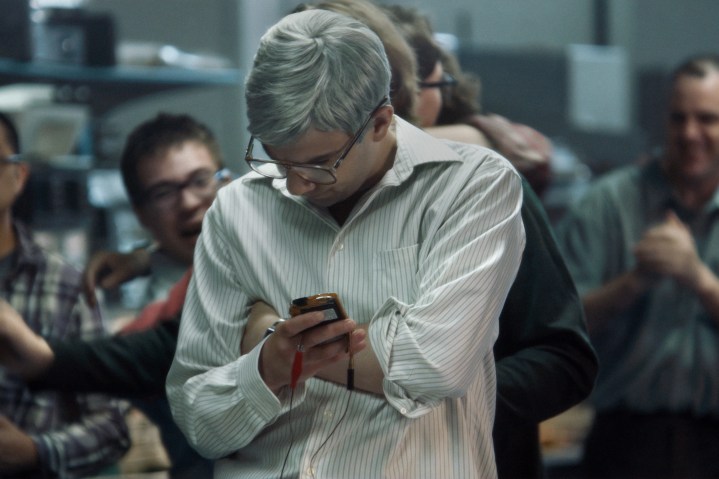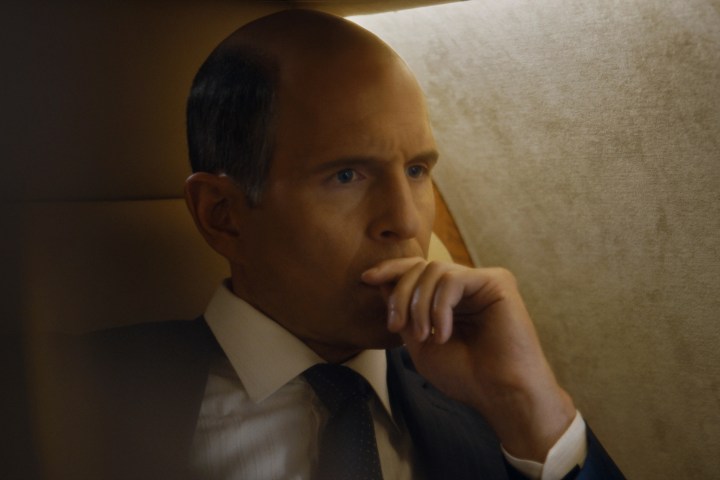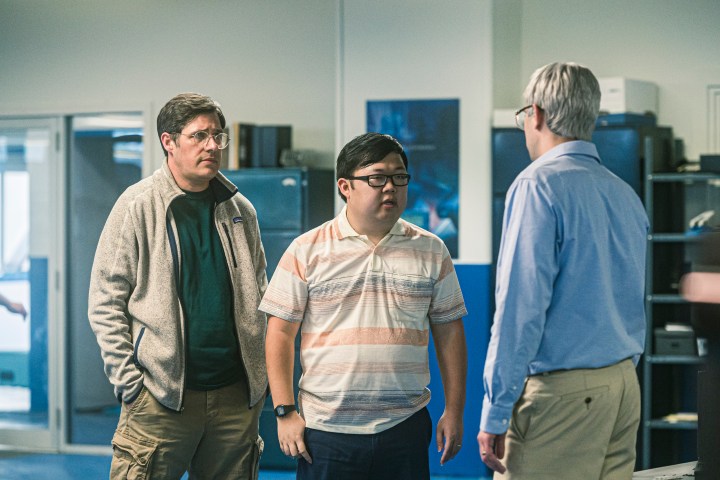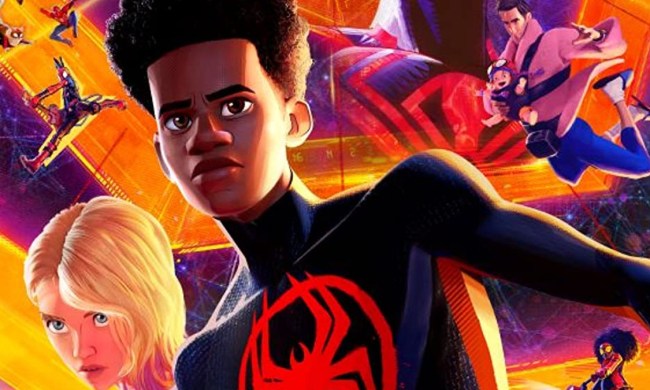“Director Matt Johnson's BlackBerry is a lean and engrossing rise-and-fall drama that currently ranks as one of the year's best films.”
- Matt Johnson's confident, assured direction
- A trio of compelling lead performances
- A complicated story that's made easily digestible
- A third-act that pulls its punches just a bit too much
BlackBerry tells a familiar story. The new film from Operation Avalanche director Matt Johnson is, in many ways, a classic rise-and-fall drama in the same vein as American epics like The Social Network and — to a much lesser extent — Goodfellas. Its players are familiar archetypes and, over the course of BlackBerry’s two-hour runtime, they fill their roles well. The film’s script, meanwhile, which was penned by Johnson and Matthew Miller, charts its objectively complex corporate story in as streamlined and straightforward a way as possible.
Unlike The Social Network, though, BlackBerry doesn’t try to make any specific points about the current state of American society. Its themes of reckless ambition and the corrosive nature of greed are timeless and, much like the rest of BlackBerry, familiar to anyone who has seen a film like it before. However, despite boasting much more modest intentions than many of its spiritual predecessors, BlackBerry is built with a level of confidence and precision that makes it one of the better movies of the year so far.

Spanning roughly 20 years, BlackBerry begins in the mid-1990s when a pair of lifelong friends, Mike Lazaridis (Jay Baruchel) and Doug Fregin (Johnson), decide to meet with an ambitious corporate shark, Jim Balsillie (Glenn Howerton), to present their pitch for a phone that can connect to the internet and receive and send emails. Jim, in the wake of losing a job due to his own arrogance, offers to help Doug and Mike pitch and sell their phone on the condition that he be named one of the CEOs of their Canada-based tech company and awarded a considerable percentage of the business itself. Mike, desperate to rise up through the tech world’s ranks, accepts Jim’s offer.
In the years that follow, Jim, Mike, and Doug manage to turn their device, the BlackBerry, into one of the most popular and important products in the world. Along the way, Doug is forced to stand by and watch as Mike becomes more and more comfortable in the corporate world that they had previously strived not to get sucked in by. Their success is, of course, inevitably challenged by the late-2000s emergence of competitors like Apple and Android, whose devices have the potential to oust BlackBerry from the world’s phone market altogether.
Those familiar with BlackBerry’s story will already know how everything ultimately ends for Mike, Doug, and Jim. Johnson’s film, to its credit, doesn’t try to hide or surprise viewers with BlackBerry’s inevitable problems. His and Miller’s script, instead, plainly plants the seeds for the company’s third-act turn, and it’s a testament to the deftness of BlackBerry‘s storytelling that the downfall of the eponymous business feels like the result of decisions made by its characters rather than shifts in the market that were simply out of their control.

On-screen, Howerton, Johnson, and Baruchel create a trio of conflicting, distinct personalities. As Balsillie, Howerton is a constantly overflowing bucket of rage and arrogance, which makes him a unique counter to Baruchel’s conflict-averse, but quietly cunning Lazaridis. In-between them, Johnson emerges as the heart and soul of BlackBerry. His Doug Fregin is a red-headband-clad movie nerd who is characterized as an anticorporate slacker for much of the film, only to later be revealed to be far wiser about the complex nature of workplace politics than he lets on. Johnson, for his part, imbues the character’s latter turn with enough empathy to render it believable.
Outside of its core trio, BlackBerry establishes a revolving door of memorable supporting characters, including Paul Stannos (Rich Sommer) and Ritchie Cheung (SungWon Cho), a pair of accomplished engineers who get poached from their respective companies by Howerton’s Balsillie. As the arrogant head of a rival phone company that’s interested in taking over BlackBerry, Cary Elwes chews up the scenery and steals one memorable second-act scene, while Saul Rubinek elevates several key moments as the spokesperson for BlackBerry’s biggest carrier partner. Altogether, these actors help flesh out the film’s otherwise stale world of corporate offices and private planes.
Despite BlackBerry‘s ambitious size and scope, editor Curt Lobb also ensures that the film moves at a consistently fast clip from the moment it begins to the moment it ends. The film speeds through its story — wisely relying on a handful of well-placed needle drops to transition between its three key time periods — without ever introducing its characters and important plot beats too quickly to allow BlackBerry to devolve into a confusing mess. In that sense, the film tonally and narratively resembles 2015’s The Big Short more closely than it does any other. Both movies, notably, succeed at rendering a staggering amount of corporate jargon easily accessible, which is a feat that’s easier said than done.

BlackBerry’s connections to The Big Short don’t stop and end with its plot. Visually, Johnson adopts the same kind of quasi-documentary style for BlackBerry as its Adam McKay-directed predecessor. The film’s aesthetic, fortunately, elevates its 1990s, analog origins, while Johnson’s slick, fast-paced directorial style works well with BlackBerry’s editorial pace and on-screen story. The film’s greatest accomplishment, in other words, is just how artistically cohesive and assured it feels. Ultimately, it’s the confidence that Johnson brings to BlackBerry that allows it to enter the same thematic and narrative arena as some of the greatest films in the history of American cinema.
The film, of course, doesn’t quite reach the same heights as many of the classics that have come before it. In its third act, BlackBerry pulls its punches just a bit too much — letting its characters off the hook for mistakes that are far too disastrous to justify the relatively light treatment they’re given. And as compelling as the story of BlackBerry’s rise and fall is, the company’s death at the hands of Apple and others doesn’t ultimately hold as much global weight as some of the other rise-and-fall stories that have been realized on-screen before.
But even if BlackBerry doesn’t hit quite hard enough to be considered an instant classic, it still makes a considerable impact. For its director, the film not only marks a new artistic high, but also announces Johnson as a filmmaker worth paying closer attention to in the years to come. His latest is a film that, unlike its protagonists, makes nearly all the right calls.
BlackBerry is now playing in theaters.




